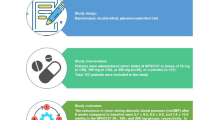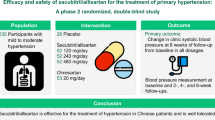Abstract
Hypertension is a major risk factor for cardiovascular disease, which is the leading cause of mortality in women in developed countries. This pooled analysis assessed the antihypertensive efficacy, safety and tolerability of monotherapy with the direct renin inhibitor aliskiren (150 mg and 300 mg) over 8–12 weeks in women with mild-to-moderate hypertension (mean sitting diastolic blood pressure (msDBP)⩾95 and <110 mm Hg) across eight randomized and double-blind trials. Safety and tolerability were assessed in the five placebo-controlled trials in the analysis. In the 1527 women enrolled in these studies, aliskiren 150 mg and 300 mg produced significantly greater blood pressure (BP) reductions (14.1/11.0 and 16.1/12.3 mm Hg, respectively) compared with placebo (7.2/7.6 mm Hg; P<0.0001). BP reductions with aliskiren monotherapy in women were similar to those observed in men, and consistent across subgroups of age, metabolic syndrome and obesity. The overall incidence of adverse events in women was similar with aliskiren treatment (150 mg, 42.3%; 300 mg, 46.0%) and placebo (39.0%); adverse events with aliskiren were more frequent in women than in men, consistent with previous studies of gender differences in drug tolerability. In conclusion, aliskiren monotherapy at 150 mg and 300 mg doses provided effective, dose-dependent BP-lowering in women with mild-to-moderate hypertension, and it was well tolerated.
This is a preview of subscription content, access via your institution
Access options
Subscribe to this journal
Receive 12 digital issues and online access to articles
$119.00 per year
only $9.92 per issue
Buy this article
- Purchase on Springer Link
- Instant access to full article PDF
Prices may be subject to local taxes which are calculated during checkout



Similar content being viewed by others
References
World Health Organization. Preventing chronic diseases: a vital investment: WHO global report. World Health Organization: Geneva, 2005.
Lloyd-Jones D, Adams R, Carnethon M, De Simone G, Ferguson TB, Flegal K et al. Heart disease and stroke statistics—2009 update. A report from the American Heart Association Statistics Committee and Stroke Statistics Subcommittee. Circulation 2009; 119: e21–e181.
Christian AH, Rosamond W, White AR, Mosca L . Nine-year trends and racial and ethnic disparities in women's awareness of heart disease and stroke: an American Heart Association national study. J Womens Health (Larchmt) 2007; 16: 68–81.
Huxley R, Barzi F, Woodward M . Excess risk of fatal coronary heart disease associated with diabetes in men and women: meta-analysis of 37 prospective cohort studies. BMJ 2006; 332: 73–78.
Huxley R, Woodward M, Barzi F, Wong JW, Pan WH, Patel A . Does sex matter in the associations between classic risk factors and fatal coronary heart disease in populations from the Asia-Pacific region? J Womens Health (Larchmt) 2005; 14: 820–828.
Polk DM, Naqvi TZ . Cardiovascular disease in women: sex differences in presentation, risk factors, and evaluation. Curr Cardiol Rep 2005; 7: 166–172.
Franklin SS . Definition and epidemiology of hypertensive cardiovascular disease in women: the size of the problem. J Hypertens Suppl 2002; 20: S3–S5.
Gueyffier F, Boutitie F, Boissel JP, Pocock S, Coope J, Cutler J et al. Effect of antihypertensive drug treatment on cardiovascular outcomes in women and men. A meta-analysis of individual patient data from randomized, controlled trials. The INDANA Investigators. Ann Intern Med 1997; 126: 761–767.
Quan A, Kerlikowske K, Gueyffier F, Boissel JP . Efficacy of treating hypertension in women. J Gen Intern Med 1999; 14: 718–729.
Wolf-Maier K, Cooper RS, Kramer H, Banegas JR, Giampaoli S, Joffres MR et al. Hypertension treatment and control in five European countries, Canada, and the United States. Hypertension 2004; 43: 10–17.
Lloyd-Jones DM, Evans JC, Levy D . Hypertension in adults across the age spectrum: current outcomes and control in the community. JAMA 2005; 294: 466–472.
Wassertheil-Smoller S, Anderson G, Psaty BM, Black HR, Manson J, Wong N et al. Hypertension and its treatment in postmenopausal women: baseline data from the Women's Health Initiative. Hypertension 2000; 36: 780–789.
Oparil S . Women and hypertension: what did we learn from the Women's Health Initiative? Cardiol Rev 2006; 14: 267–275.
Oh BH, Mitchell J, Herron JR, Chung J, Khan M, Keefe DL . Aliskiren, an oral renin inhibitor, provides dose-dependent efficacy and sustained 24-h blood pressure control in patients with hypertension. J Am Coll Cardiol 2007; 49: 1157–1163.
Gradman AH, Schmieder RE, Lins RL, Nussberger J, Chiang Y, Bedigian MP . Aliskiren, a novel orally effective renin inhibitor, provides dose-dependent antihypertensive efficacy and placebo-like tolerability in hypertensive patients. Circulation 2005; 111: 1012–1018.
Frampton JE, Curran MP . Aliskiren: a review of its use in the management of hypertension. Drugs 2007; 67: 1767–1792.
Pool JL, Schmieder RE, Azizi M, Aldigier JC, Januszewicz A, Zidek W et al. Aliskiren, an orally effective renin inhibitor, provides antihypertensive efficacy alone and in combination with valsartan. Am J Hypertens 2007; 20: 11–20.
Villamil A, Chrysant SG, Calhoun D, Schober B, Hsu H, Matrisciano-Dimichino L et al. Renin inhibition with aliskiren provides additive antihypertensive efficacy when used in combination with hydrochlorothiazide. J Hypertens 2007; 25: 217–226.
Andersen K, Weinberger MH, Egan B, Constance CM, Ali MA, Jin J et al. Comparative efficacy and safety of aliskiren, an oral direct renin inhibitor, and ramipril in hypertension: a 6-month, randomized, double-blind trial. J Hypertens 2008; 26: 589–599.
Kushiro T, Itakura H, Abo Y, Gotou H, Terao S, Keefe DL . Aliskiren, a novel oral renin inhibitor, provides dose-dependent efficacy and placebo-like tolerability in Japanese patients with hypertension. Hypertens Res 2006; 29: 997–1005.
Uresin Y, Taylor A, Kilo C, Tschoepe D, Santonastaso M, Ibram G et al. Efficacy and safety of the direct renin inhibitor aliskiren and ramipril alone or in combination in patients with diabetes and hypertension. J Renin Angiotensin Aldosterone Syst 2007; 8: 190–198.
Schmieder RE, Philipp T, Guerediaga J, Gorostidi M, Smith B, Weissbach N et al. Long-term antihypertensive efficacy and safety of the oral direct renin inhibitor aliskiren: a 12-month randomized, double-blind comparator trial with hydrochlorothiazide. Circulation 2009; 119: 417–425.
NCEP. Third Report of the National Cholesterol Education Program (NCEP) Expert Panel on Detection, Evaluation, and Treatment of High Blood Cholesterol in Adults (Adult Treatment Panel III) final report. Circulation 2002; 106: 3143–3421.
White WB, Anderson DR, Arora V, Bush C, Keefe DL . Antihypertensive effectiveness of the direct renin inhibitor aliskiren in patients with metabolic syndrome: a comparative analysis of 7219 patients from 10 randomized trials. Eur Heart J 2007; 28: 868 P4845.
Schmieder RE, Philipp T, Guerediaga J, Gorostidi M, Bush C, Keefe DL . Aliskiren-based therapy lowers blood pressure more effectively than hydrochlorothiazide-based therapy in obese patients with hypertension: sub-analysis of a 52-week, randomized, double-blind trial. J Hypertens 2009; 27: 1493–1501.
Ong KL, Tso AW, Lam KS, Cheung BM . Gender difference in blood pressure control and cardiovascular risk factors in Americans with diagnosed hypertension. Hypertension 2008; 51: 1142–1148.
August P, Oparil S . Hypertension in women. J Clin Endocrinol Metab 1999; 84: 1862–1866.
Coylewright M, Reckelhoff JF, Ouyang P . Menopause and hypertension. An age-old debate. Hypertension 2008; 51: 952–959.
Fernandez-Vega F, Abellan J, Vegazo O, De Vinuesa SG, Rodriguez JC, Maceira B et al. Angiotensin II type 1 receptor blockade to control blood pressure in postmenopausal women: Influence of hormone replacement therapy. Kidney Int 2002; 62 (Suppl 82): 36–41.
Lewis CE . Characteristics and treatment of hypertension in women: a review of the literature. Am J Med Sci 1996; 311: 193–199.
Philipp T, Anlauf M, Distler A, Holzgreve H, Michaelis J, Wellek S . Randomised, double blind, multicentre comparison of hydrochlorothiazide, atenolol, nitrendipine, and enalapril in antihypertensive treatment: results of the HANE study. HANE Trial Research Group. BMJ 1997; 315: 154–159.
Kando JC, Yonkers KA, Cole JO . Gender as a risk factor for adverse events to medications. Drugs 1995; 50: 1–6.
Rademaker M . Do women have more adverse drug reactions? Am J Clin Dermatol 2001; 2: 349–351.
Anderson GD . Sex and racial differences in pharmacological response: where is the evidence? Pharmacogenetics, pharmacokinetics, and pharmacodynamics. J Womens Health (Larchmt) 2005; 14: 19–29.
Miller MA . Gender-based differences in the toxicity of pharmaceuticals—the Food and Drug Administration's perspective. Int J Toxicol 2001; 20: 149–152.
Lewis CE, Grandits A, Flack J, McDonald R, Elmer PJ . Efficacy and tolerance of antihypertensive treatment in men and women with stage 1 diastolic hypertension. Results of the Treatment of Mild Hypertension Study. Arch Intern Med 1996; 156: 377–385.
Taler SJ . Hypertension in women. Curr Hypertens Rep 2009; 11: 23–28.
Os I, Bratland B, Dahlof B, Gisholt K, Syvertsen JO, Tretli S . Female preponderance for lisinopril-induced cough in hypertension. Am J Hypertens 1994; 7: 1012–1015.
Gibson GR . Enalapril-induced cough. Arch Intern Med 1989; 149: 2701–2703.
Yeo WW, Foster G, Ramsay LE . Prevalence of persistent cough during long-term enalapril treatment: controlled study versus nifedipine. Q J Med 1991; 80: 763–770.
Hammond JJ, Cutler SA . A comparison of isradipine and felodipine in Australian patients with hypertension: focus on ankle oedema. The Physician's Study Group. Blood Press 1993; 2: 205–211.
Sharabi Y, Illan R, Kamari Y, Cohen H, Nadler M, Messerli FH et al. Diuretic induced hyponatraemia in elderly hypertensive women. J Hum Hypertens 2002; 16: 631–635.
Sonnenblick M, Friedlander Y, Rosin AJ . Diuretic-induced severe hyponatremia. Review and analysis of 129 reported patients. Chest 1993; 103: 601–606.
Clark BG, Wheatley R, Rawlings JL, Vestal RE . Female preponderance in diuretic-associated hypokalemia: a retrospective study in seven long-term care facilities. J Am Geriatr Soc 1982; 30: 316–321.
Toner JM, Ramsay LE . Thiazide-induced hypokalaemia; prevalence higher in women. Br J Clin Pharmacol 1984; 18: 449–452.
Acknowledgements
All authors participated in the development and writing of the paper, and approved the final paper for publication. We take full responsibility for the content of the paper and thank Drs Andrew Mayhook and Jenny Handford (Oxford PharmaGenesis Ltd, Oxford, UK) for medical writing support, editorial assistance and collation and incorporation of comments from all authors. This work was funded by Novartis Pharmaceuticals Corporation, East Hanover, NJ, USA.
Author information
Authors and Affiliations
Corresponding author
Ethics declarations
Competing interests
AHG has received research grants from Novartis; served on speakers’ bureaus for Novartis, Merck, Daiichi-Sankyo, AstraZeneca, Pfizer, Boehringer-Ingelheim and Forest Laboratories; and as a consultant/on advisory boards for Novartis, Daiichi-Sankyo, Forest Laboratories, Merck and AstraZeneca. MRW has served as a scientific advisor for Novartis, Daiichi-Sankyo, Boehringer-Ingelheim and MSD. MW is an employee of Novartis Pharma AG, Basel, Switzerland; and CAB and DLK are employees of Novartis Pharmaceuticals Corporation, East Hanover, NJ, USA; all three are thus eligible for Novartis stock and stock options.
Rights and permissions
About this article
Cite this article
Gradman, A., Weir, M., Wright, M. et al. Efficacy, safety and tolerability of aliskiren, a direct renin inhibitor, in women with hypertension: a pooled analysis of eight studies. J Hum Hypertens 24, 721–729 (2010). https://doi.org/10.1038/jhh.2010.11
Received:
Revised:
Accepted:
Published:
Issue Date:
DOI: https://doi.org/10.1038/jhh.2010.11
Keywords
This article is cited by
-
Sex differences in cardiovascular actions of the renin–angiotensin system
Clinical Autonomic Research (2020)
-
Aliskiren, the first direct renin inhibitor: assessing a role in pediatric hypertension and kidney diseases
Pediatric Nephrology (2014)
-
Aliskiren vs. other antihypertensive drugs in the treatment of hypertension: a meta-analysis
Hypertension Research (2013)
-
An Observational, Prospective, Open-Label, Multicentre Evaluation of Aliskiren in Treated, Uncontrolled Patients
High Blood Pressure & Cardiovascular Prevention (2012)



